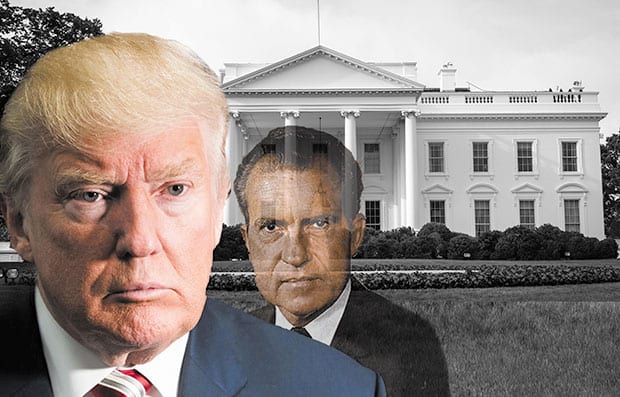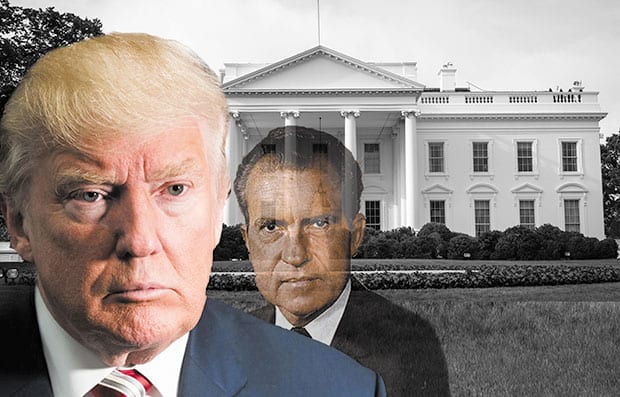Only time will tell if the similarities between Nixon in ’72 and Trump in ’17 will continue to play out

 Watching the unraveling of Republican U.S. President Richard M. Nixon’s administration in the early 1970s surely seemed like a once-in-a-lifetime event. But now, 45 years later, some wonder if it could be happening again with President Donald J. Trump.
Watching the unraveling of Republican U.S. President Richard M. Nixon’s administration in the early 1970s surely seemed like a once-in-a-lifetime event. But now, 45 years later, some wonder if it could be happening again with President Donald J. Trump.
Just five months into Trump’s first term, many people are speculating he might not even get to stay in office through his first term, let alone run for a second term in 2020. As unbelievable as it sounds today, it seemed even more incredible in 1974 when Nixon resigned in disgrace in the aftermath of the investigation known as Watergate.
Nixon, the 37th president and a Republican, fell from grace in his second term and became the first president to resign after it became clear his administration had attempted to cover up his re-election campaign’s involvement in the 1972 burglary of the Democratic National Committee offices.
In that crime five men broke into the offices in the Watergate Complex to find damaging information that would help Nixon defeat Democratic Party candidate Sen. George S. McGovern.
Most scholars agree that the burglary alone, financed by a secret slush fund created from campaign funds, did not take down Nixon. Efforts by the president and his chief staffers to cover up the administration’s involvement by interfering with investigations by the police, FBI, congressional committees and a special prosecutor amounted to obstruction of justice and resulted in the indictments of 40 government officials.
Nixon resigned Aug. 9, 1974, to avoid criminal charges and even more public humiliation. His successor, President Gerald R. Ford, fully pardoned him a month later on Sept. 8. But many other officials wound up serving time.
Now Trump, the 45th president and a Republican, seems to be embroiled in eerily similar circumstances as those in which Nixon found himself some 45 years ago.
U.S. intelligence officials confirm they believe — with certainty — that Russian hackers interfered with the 2016 presidential election by releasing information detrimental to the campaign of Democratic candidate Hillary Clinton. Congressional committees are investigating the alleged Russian interference; there is an FBI investigation also underway, and the Department of Justice has appointed a special counselor, former FBI Director Robert S. Mueller, to investigate the allegations and possibly prosecute anyone indicted in such a conspiracy.
A month after Trump’s inauguration, he fired his high-ranking campaign advisor and newly-appointed national security advisor, Michael T. Flynn, after questions arose about the veteran general’s association with foreign governments and communications with Russian Ambassador to the U.S. Sergey Kislyak. Flynn allegedly lied to Vice President Michael R. Pence about the matter, and the president asked for his resignation.
Along with Flynn, other Trump campaign officials, including his son-in-law and husband of daughter Ivanka Trump, Jared C. Kushner, also face questioning by investigators about their contact with Russian officials.
In the past two weeks, former FBI Director James B. Comey testified before the Senate Intelligence Committee about Trump firing him, and Attorney General Jefferson B. Sessions also appeared before the committee a week afterwards, declining to answer many questions because it would be “contrary to long-standing Department of Justice policy” to reveal the content of the president’s conversations with him. Under questioning from senators, Sessions would not characterize his refusal to answer as “executive privilege,” a concept that failed to protect Nixon from releasing tape recordings and other evidence during the Watergate investigation.
Comey testified that in a meeting shortly after Flynn’s firing that Trump asked other officials, including Sessions, to leave the Oval Office, and that the president suggested he not investigate Flynn. Trump also asked if he personally was under investigation, he said. Comey also said that he viewed Sessions’ involvement in his firing as improper because the attorney general had recused himself from any matters related to the Russian investigation because he served as an official advisor for the Trump campaign.
After Trump fired Comey, he told an NBC anchor in an interview he fired the FBI director because he was unhappy about the Russian investigation.
The president previously hinted he may have tape recordings of his conversations with Comey.
Curiously, Sessions testified that he recommended Comey’s firing in a memo at the request of Trump because he thought Comey had made errors in judgment about press conferences related to a separate investigation of former Secretary of State Clinton’s email scandal. A senator pointed out that
Sessions had previously praised Comey in media interviews regarding the investigation of Clinton’s emails, to which Sessions had little response.
Late last week, a friend of Trump’s told reporters he suspected the president might be considering firing special counsel Mueller. Is there no end to the bizarreness?
It’s no coincidence that television cable channels are frequently showing All the President’s Men, the story of Watergate and how the media, particularly the Washington Post and other newspapers, revealed the conspiracy to the American public through dogged reporting. That reporting, of course, unleashed vicious criticism on the media by politicians and other government officials.
Deja vu appears to be the operative word here, and only time will tell if the investigation will come to be known to future generations as Russiagate, Trumpgate — or nothing much at all.
David Webb is a veteran journalist with more than four decades of experience, including a stint as a staff reporter for Dallas Voice. In 2015, he received the Press Club of Dallas’ Legends Award, bestowed in large part for his work with Dallas Voice. He now lives on Cedar Creek Lake and writes for publications nationwide.
This article appeared in the Dallas Voice print edition June 16, 2017.
















